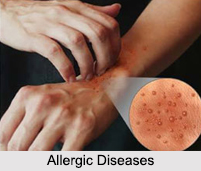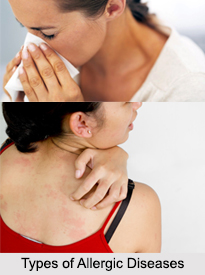 Allergic Diseases are referred to as the disorder of the immune system, often known as `Atopy`. Allergic reactions occur to environmental substances known as `Allergens`; these reactions are acquired, predictable and rapid. Strictly, allergy is one of four forms of hypersensitivity and is called type I (or immediate) hypersensitivity and it is characterised by excessive activation of certain white blood cells called mast cells and basophils by a type of antibody known as IgE, resulting in an extreme inflammatory response later known as allergy diseases.
Allergic Diseases are referred to as the disorder of the immune system, often known as `Atopy`. Allergic reactions occur to environmental substances known as `Allergens`; these reactions are acquired, predictable and rapid. Strictly, allergy is one of four forms of hypersensitivity and is called type I (or immediate) hypersensitivity and it is characterised by excessive activation of certain white blood cells called mast cells and basophils by a type of antibody known as IgE, resulting in an extreme inflammatory response later known as allergy diseases.
Types of Allergic Diseases
Common allergic diseases include eczema, hives, hay fever, asthma, food allergies, and reactions to the venom of stinging insects such as wasps and bees. Some of the allergic diseases are discussed below;
Allergic Rhinitis: Allergic rhinitis is the most common allergy diseases which are defined as inflammation of the nasal membranes. It is characterised by a complex symptom that consists of any combination of sneezing, nasal congestion, nasal itching and rhinorrhea. The eyes, ears, sinuses and throat can also be involved in Allergic Rhinitis.
Asthma: Asthma is an allergy disease that affects the lungs and the airways that deliver air to the lungs.  It causes periodic attacks of wheezing and difficult breathing. An asthma attack occurs when the airways become inflamed in response to a trigger, such as dust, mold, pets, exercise or cold weather. Such attacks can range from mild, moderate, or severe, and can last for a few minutes, a few hours, or several days.
It causes periodic attacks of wheezing and difficult breathing. An asthma attack occurs when the airways become inflamed in response to a trigger, such as dust, mold, pets, exercise or cold weather. Such attacks can range from mild, moderate, or severe, and can last for a few minutes, a few hours, or several days.
Eczema: Atopic dermatitis is a type of eczema and an inflammatory, chronically relapsing, non-contagious and pruritic skin disease. The skin of a patient with atopic dermatitis reacts abnormally and easily to irritants, food and environmental allergens and becomes red, flaky and very itchy. It also becomes susceptible to surface infections caused by bacteria.
Urticaria: Urticaria, also known as `Hives` are a kind of allergic disease or skin rash notable for dark red, raised and itchy bumps. It can be triggered by many substances or situations and usually starts as an itchy patch of skin that turns into swollen red welts. The itching may be mild to severe. Scratching, alcoholic beverages and emotional stress may worsen the itching.
Treatment of Allergic Diseases
A variety of tests now exist to diagnose allergic diseases; these include testing the skin for responses to known allergens or analysing the blood for the presence and levels of allergen-specific IgE. Treatments for allergic diseases include allergen avoidance, use of anti-histamines, steroids or other oral medications, immunotherapy to desensitise the response to allergen, and targeted therapy of allergic diseases.




















